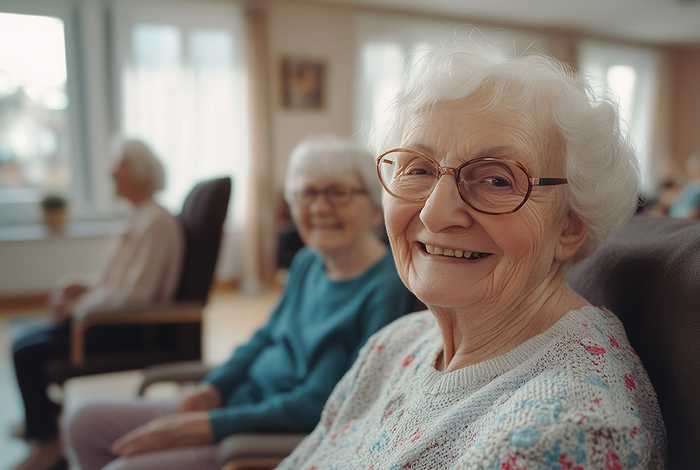Posted by Declan Davey
Summer heat and the elderly: 10 tips to keep cool
The summer weather is hit-and-miss in the UK, but we need to prepare for the possibility of a heatwave.
The Autumna team often gets an increase in calls in July and August. Relatives of elderly people contact us with concerns about how a hot spell can impact their loved one’s health.
In this article, Autumna will answer the key questions about summer heat and elderly safety.
- Guidelines on how seniors can keep cool during the warmer months
- The ideal room temperature for elderly people
- Heatstroke symptoms in the elderly
Hot Weather Tips For Seniors — How to Stay Comfortable and Cool
Tip 1. Limit direct sun exposure
Elderly people can avoid the worst of the summer heat by scheduling activities during cooler hours. We suggest early-mid morning or late afternoon and evening.
If you need to attend appointments, ask if slots are available slots at the start or the end of the day. This will reduce harmful exposure to UV rays during peak hours.
Tip 10. Don’t have air conditioning? Go to these places instead
Air conditioning is a blessing during the summer months, but many households don’t have access to this. Instead, visit community settings where air conditioning is in place.
Cafes, libraries, and recreation centres may be worth a try. Be sure to phone in advance to double-check that they’re open.
What Is The Ideal Room Temperature For Elderly People?
The NHS advises that the ideal room temperature for elderly people is at least 18°C. However, this guideline relates to staying well in cold weather.
What temperature is too high for seniors, then?
The normal body temperature is 37°C, but adults over 65 often experience a decrease in body temperature — to around 36.2°C.
Health In Aging states that when the temperature is over 80°F (26.7°C), seniors ought to take precautions to reduce the risk of overheating.
Bear in mind that the temperature inside your home can vary from the temperature outside.
Do you have concerns about how you or an elderly relative will manage in the summer heat?
Installing a thermometer may help you feel more at ease.
If the temperature in the home does reach 26-27°C, you can take action on some of the 10 tips mentioned above.
Heat Stroke Symptoms in The Elderly
Heatstroke symptoms in the elderly are the same as they are for people of other ages, but there are two risk factors for seniors to pay attention to:
- Over 65s are more likely to have underlying health conditions that make a case of heatstroke even more serious.
- Heatstroke symptoms in the elderly may be ignored, due to mistaking the symptoms for those of known health conditions.
Common symptoms of dehydration include thirst, dizziness, darker pee, and urinating less than four times a day.
People with diabetes are more susceptible to dehydration. Those taking diuretic medications (that make you pee more) also need to be careful.
The risk of heatstroke is lowered if early symptoms of dehydration are addressed.
But what are the heatstroke symptoms in elderly people to watch out for? Here’s a list of the main symptoms:
- Core body temperature over 40°C
- Red or hot skin
- Muscle weakness
- Fast heart rate
- Fainting
- Shallow breathing
- Nausea/vomiting
- Lack of sweating despite the hot weather
- Confusion or disorientation
You may be wondering what you can do to prevent heatstroke in the event of a heatwave..
These are a few sensible strategies for managing the summer heat:
- Review any medications that may change how your body stays hydrated.
- Make sure to wear sunscreen over SPF 15.
- Have access to fluids at all times, particularly when leaving home.
- Wear a hat or protective item for the head.
- Avoid activity during the hottest parts of the day, which are typically 11 am - 3 pm
Autumna offers free advice on all elderly care issues
Did you know you can use our website to search for local care at home and in the community?
In the search box on the home page, enter the area in which you are looking for home care, live-in care or care homes. Use the various filters to narrow down your search to find exactly which care homes or domiciliary services offer the type of elderly care you are looking for.
Use the shortcut menu and search for 'outstanding care homes' for example. Or if your search is simply based around the question: "Where is there a care home near me?" or "Where can I find a home care service or live in care agency near me?" then simply filter by distance.
Source: Autumna
For more elderly support, you can visit our various detailed advice pages.
If you have a question like “What are the best care homes near me?” or “How much does Lasting Power of Attorney cost?” call our friendly team of experts on 01892 33 53 30.
Our thanks to healthcare writer, Declan Davey for his help putting this blog together.
Other articles to read
Autumna Blog

Older Persons Care Advice
Ultimate guide to care homes in Norwich
April 23rd, 2025
Discover the best care homes in Norwich—explore lifestyle-focused options, top-rated services, and how to choose the right home with confidence.

Older Persons Care Advice
How to find an adult day care centre near you
April 22nd, 2025
Looking for an adult day care centre near you? Discover how to find safe, joyful care for your loved one—and support for yourself—on Autumna.

Older Persons Care Advice
How to shortlist care homes in Exeter
April 17th, 2025
Need help shortlisting care homes in Exeter? Learn how to filter options with confidence, compare homes, and find the best fit with Autumna’s free tools.






